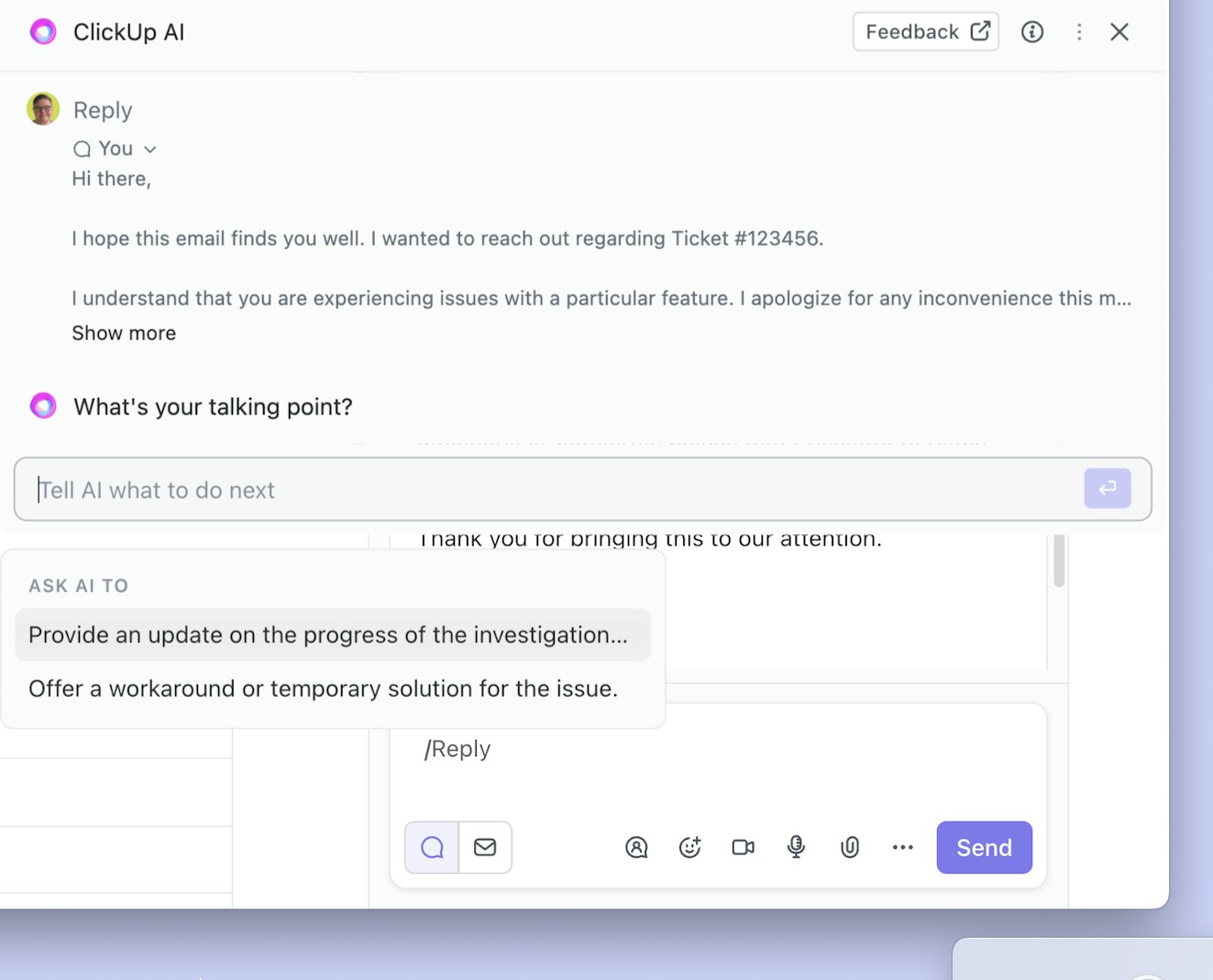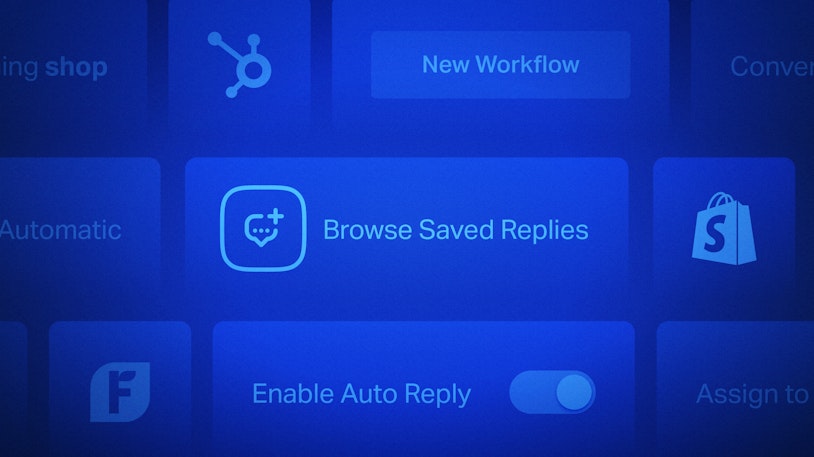While AI may be everywhere these days, the use of AI in ecommerce transcends mere trend. Its diverse applications range from enhancing product searches to tailoring personal recommendations and even to automation in customer support. With the explosion of AI over the past few years, these benefits can sometimes get lost in AI’s novelty.
That's where we come in. In this guide, we’ll deconstruct the roles, benefits, and applications of artificial intelligence in ecommerce. We'll also spotlight some leading ecommerce AI tools and explore future trends so you can leverage AI effectively, translating this technological innovation into measurable business success.
The role of AI in ecommerce
When we say artificial intelligence (AI), a few things might spring to mind — perhaps efficient autonomous robots, self-driving cars, or smart personal assistants like Alexa and Siri. But at its core, AI is simply about systems or machines that mimic human intelligence. This encompasses learning (acquiring information and rules for using it), reasoning (using these rules to reach approximate or specific conclusions), and self-correction.
Given the current digital boom and the shift in consumer shopping behavior, more and more businesses are leveraging AI to respond to market changes effectively and to keep a competitive edge.
AI fits into the ecommerce industry by helping retailers automate processes, offer personalized customer experiences, and make data-driven decisions. AI makes it possible for ecommerce businesses to recommend products to customers based on a number of factors like their previous purchase history or search data.
Further, AI chatbots for ecommerce and customer service automation are moving stride for stride with human-based interaction, allowing businesses to provide cutting-edge customer support, even with minimal hands on deck. When a customer has a query or issue, these AI-based systems can step in, saving time and resources and potentially leading to happier customers.
The technology behind AI in ecommerce
As we get into the technology that drives AI in the ecommerce world, two terms often come to the forefront: machine learning and generative AI.
Machine learning falls under the AI umbrella and is based on the idea that systems can learn from gathered data to identify patterns and make decisions independently. When applied to ecommerce, machine learning algorithms enable powerful capabilities such as product recommendations based on customer behavior or predicting trends to optimize inventory management.
Generative AI, on the other hand, is a branch of AI that involves systems capable of creating content like images, texts, or even music. In ecommerce, this technology can be applied to generate product descriptions, manage customer inquiries more efficiently, and even predict customer needs based on behavior patterns.
As you can imagine, both machine learning and generative AI can have a far-reaching impact on an ecommerce operation. For instance, an appropriately trained machine learning algorithm could sift through vast amounts of data to identify critical shopping trends or anticipate periods of high demand. Similarly, leveraging generative AI could lead to highly personalized customer interactions, creating an efficient and seamless online shopping experience.
Aside from machine learning and generative AI, ecommerce businesses often turn to chatbots, natural language processing (NLP), and data analytics tools to enhance their operations. AI tools can automate customer support interactions, provide insights into customer preferences, and streamline mundane tasks that would otherwise consume considerable time and resources.
In the big picture, the technology powering AI in ecommerce is about a lot more than just convenience. It's about leveraging advanced tech solutions to understand, anticipate, and cater to customer needs, ultimately enhancing the shopping experience while optimizing business operations in a very real, very impactful way.
Benefits of using artificial intelligence in ecommerce
AI is more than the next big thing in ecommerce. It's a powerful tool that provides tangible benefits for your business and your customers. Let's delve into some key benefits.
Improved customer experience
One of the most significant impacts of AI in ecommerce is how it can enhance the customer experience, ensuring shoppers come back for more. Through personalization, AI can suggest products that align with a customer's previous purchases or browsing behavior. Think of it as a highly effective personal shopping assistant who knows each customer's preferences and can guide them through product selection.
Additionally, many AI platforms provide real-time assistance to customers through AI chatbots or virtual assistants, addressing queries or concerns immediately and increasing customer satisfaction.
Enhancements in sales and marketing strategies
AI can also assist with sales and marketing strategies. With the ability to analyze vast quantities of data, AI enables you to offer personalized product recommendations, driving up sell and cross-sell opportunities while predictive marketing and remarketing efforts can be significantly enhanced with AI. By using machine learning to analyze past behaviors and patterns, AI can predict future trends or preferences, helping businesses to craft proactive marketing campaigns.
In a similar way, AI can play a crucial role in remarketing by making it easier to connect with customers who have previously shown interest in specific products or services, encouraging them to complete their purchase.
Efficiency in business processes
AI can also play a role in streamlining business operations, allowing you to increase efficiency while reducing costs. For example, in logistics and warehouse management, AI can optimize delivery routes or manage inventory, reducing waste and saving time. It can also be instrumental in fighting ecommerce fraud by using pattern recognition to detect and prevent suspicious activities, giving you and your customers peace of mind.
Understanding how AI is used in ecommerce
By deciphering patterns and making data-based predictions, AI opens up an array of opportunities for retailers to boost their operations and customer experience. Let's explore some of the key ways AI is used in ecommerce.
Personalization and product recommendations
One of the primary applications of AI in ecommerce is personalization. AI-powered systems can significantly improve customer experience by providing personalized product recommendations. By analyzing a customer's shopping history and behavior, these systems can suggest items the customer might find interesting, thereby increasing the chances of a purchase.
Improved search features
AI can greatly enhance search features on ecommerce platforms. Through natural language processing and image recognition, AI makes search results more accurate and relevant. Consumers can even conduct visual searches for products and get results that closely match their uploaded images.
Optimization of product descriptions
AI systems can be instrumental in optimizing product descriptions. Through generative AI, businesses can automate the creation of unique, SEO-friendly product descriptions. This not only saves considerable time but also helps improve visibility on search engines.
Dynamic pricing strategies
With AI, retailers can deploy dynamic pricing strategies that consider various factors such as demand, competitor prices, and user behavior. AI algorithms can enable you to make real-time pricing adjustments to optimize sales and profits.
AI in customer support
AI has several applications when it comes to customer support. For starters, AI-powered chatbots can handle routine customer inquiries, saving time for human agents to tackle more intricate issues. Additionally, AI-powered tools can assist agents by providing them with customer information and relevant solutions during a support call. With features like automated tagging, routing, and suggested responses, AI plays a crucial role in streamlining customer support operations.
Customer behavior analysis and data analytics
AI tools make it easy to sift through vast amounts of customer data to extract insights about shopping habits and preferences. These insights can inform business strategies, from marketing campaigns to product development. Furthermore, AI can automate data analytics and reporting, making it easier for companies to keep track of key performance metrics.
The 5 best AI tools for ecommerce
Now that you’re familiar with AI’s benefits and ecommerce applications, let’s take a look at some of the best AI solutions for ecommerce businesses.
Help Scout
ClickUp
Descript
ViSenze
Barilliance
1. Help Scout
Best ecommerce AI tool for human-centric customer support.
Help Scout is a customer communications platform designed to help you have better conversations with your customers. We believe in integrating AI into our platform in a thoughtful (and intentional) way, using the features not to replace your support team but to enhance the valuable work they already do.
Help Scout has three main AI features:
AI summarize is a feature that uses natural language processing to digest lengthy conversation threads and highlight key information. This saves agents time, allowing them to read a few quick bullets to get caught up with a conversation vs. having to wade through lengthy email threads.
AI assist is a writing tool that is available in Help Scout’s inbox and knowledge base editors. It helps your team improve their writing by handling tasks like altering the length or tone of their text to better fit the needs of the situation. It can also help check copy for spelling and grammar errors or translate it into another language.
AI drafts (powered by SupportAgent.ai) uses machine and generative AI technologies to automatically draft replies based on customer queries and articles in your knowledge base. This feature gives your team a head start on every conversation, helping reduce response time and improve the consistency of their replies.
Beyond our AI features, we also have other tools that can help you better engage with your customers. Beacon, our messaging widget, can help you deliver proactive support or send targeted messages to certain segments of your customer base. Another type of message, microsurveys, can help you reach out for feedback from customers during key points in the customer journey.
Finally, we also offer Docs, a user-friendly knowledge base solution. Display answers to FAQs in a customizable help center, or let customers browse them from your website or app using a Beacon.
Price: Free trial available. Plans with AI start at $40/user per month. Details on SupportAgent.ai pricing can be found here.
Learn more about Help Scout:
2. ClickUp
Best ecommerce AI tool for project management.

ClickUp is a productivity platform which houses your work documents, tasks, conversations, goals, and more. ClickUp’s goal is to eliminate the need for tons of different tools and provide a central workspace for teams.
ClickUp AI is the platform's AI-powered assistant. Using AI, you can easily generate summaries for task updates, comments, meeting notes, and more as well as create action items and subtasks based on your existing tasks and docs. The platform also uses AI to improve your writing, save your team time with pre-structured headers and tables, and brainstorm everything from event planning to feature naming.
Price: Free trial available. Plans start at $7/user per month. ClickUp AI is available for an additional $5/user per month.
3. Descript
Best ecommerce AI tool for creating and editing audio/video content.
Descript is a collaborative audio/video editing software that combines traditional media editing and advanced transcription technology.
The platform utilizes AI algorithms for automatic and highly accurate transcription capabilities, turning spoken words into searchable and editable text. Another standout feature is Overdub, an AI-driven voice synthesizer that can generate a realistic copy of any voice based on a sample. This can save your team hours creating seamless voiceovers and reducing the need for re-recordings.
Price: Free trial available. Plans start at $12/user per month.
4. ViSenze
Best ecommerce AI tool for on-site search and product discovery.
ViSenze is an AI software for ecommerce that aids in search and product discovery. By integrating visual search and image recognition APIs, ViSenze seeks to transform the way shoppers discover and interact with merchandise online.
The platform's AI-powered visual search engine enables customers to discover products simply by taking or uploading an image. Additionally, ViSenze’s automated product tagging feature uses deep learning to identify and tag products within an image, streamlining inventory management and enhancing recommendation accuracy. There's also an AI-driven personalization feature that customizes product recommendations based on individual user behavior, creating a personalized shopping experience.
Price: Contact for pricing.
5. Barilliance
Best ecommerce AI tool for personalized online shopping experiences.
Barilliance enables your team to deliver personalized omnichannel ecommerce experiences. The platform focuses on increasing your bottom line through more sales, increased conversions, and customer retention.
The AI Product Recommendation tool uses machine learning algorithms to learn from user behavior to predict a shopper’s next purchase for real-time personalization. Barilliance also uses predictive AI to identify customers who might abandon their carts, triggering automated and timely recovery emails. Additionally, the platform uses AI to calculate and forecast customer lifetime value, enabling more targeted marketing and retention strategies.
Price: Contact for pricing.
The future of AI in the ecommerce industry
AI continues to grow in its influence in the ecommerce sector, and that growth is likely to continue. Key trends suggest that AI will continue to facilitate personalized shopping experiences.
We're also likely to see more businesses using AI to identify and understand customer issues faster and more accurately. There's potential to use natural language processing to detect disappointed customers, urgent issues, or specific product complaints from mountains of customer interactions.
As AI continues to make its mark, you can prepare your ecommerce business by investing time to understand how to integrate AI without losing the personal human touch at the heart of your relationship with your customers.
Embracing AI as part of your ecommerce business strategy
As AI becomes more widely used, it's important to understand that the technology is there to assist, not replace, the human touch. AI should enhance the customer experience, making it more personal, efficient, and — ultimately — rewarding for your customers and your business.
Would you like to see how AI can be integrated into your own customer support operations? Start a free trial of Help Scout today and explore the possibilities for yourself.








